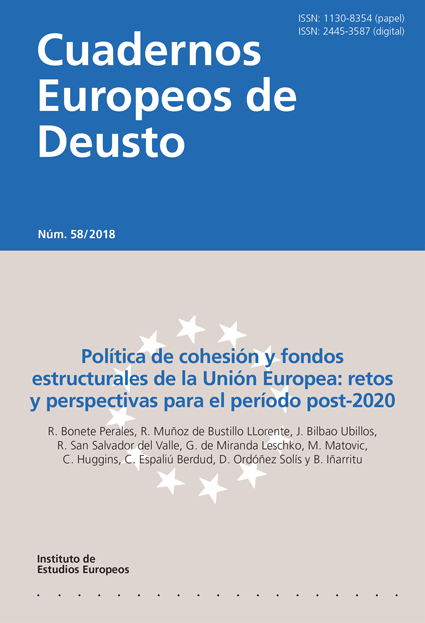Cities in the European Union. Integration process, cohesion policies and future governance
Abstract
The process of community integration and the cohesion policies of the European Union are mainly concerned with the state realities, protagonists of the process. However, the search for a harmonious development that reduces differences between regions is making its way onto the community agenda. From the text of the Treaty of Rome to the current Treaty of Lisbon, from the first document on regional policy in 1965, through the creation of the Structural Funds (1989) and Cohesion (1994), to the current INTERREG V program (2014), the Europe of the Regions has been consolidating its position in the Europe of the States. The cities, local authorities and municipalities will have to wait until 1994, in the wake of the Treaty of Maastricht, to achieve a space within the complex framework of the Union. From the first URBAN (1994) to the Amsterdam Pact and the 2020 Urban Agenda (2016), cities have been gaining prominence in community multi-governance. At present, the challenges of the Union are, in large part, the challenges facing its cities. We are facing the challenge of a Europe of Cities within the framework of glocal governance.
Received: 23 January 2018
Accepted: 29 January 2018
Published online: 28 March 2018
Downloads
The author grants to the Publisher the distribution, public communication, and reproduction rights of her/his work subject of publication in Deusto Journal of European Studies (DJES), whichever the media may be, including the permission to include it in the databases where this Journal is indexed and in the institutional repository of the Universidad de Deusto.
Upon its publication, the content of any Issue of Deusto Journal of European Studies (DJES) can be accessed, read, downloaded, copies, and distributed freely for non-commercial purposes and in accordance with any applicable copyright legislation.
The content of Deusto Journal of European Studies (DJES) can be subsequently published in other media or journals, as long as the author clearly indicates in the first footnote that the work was published in Deusto Journal of European Studies (DJES) for the first time, indicating the Issue number, year, pages, and DOI (if applicable). Any other use of its content in any medium or format, now known or developed in the future, requires prior written permission of the copyright holder.
The content of the work published in Deusto Journal of European Studies (DJES) is each author's sole responsibility. The authors assume the responsibility of obtaining all the necessary licenses for the reproduction in their manuscripts of any text, material or illustration coming from another author, institution or publication. The liabilities that may arise from complaints for publishing plagiarised articles are the sole responsibility of the author.


3.jpg)
2.jpg)
2.jpg)
2.jpg)
2.jpg)
2.jpg)







